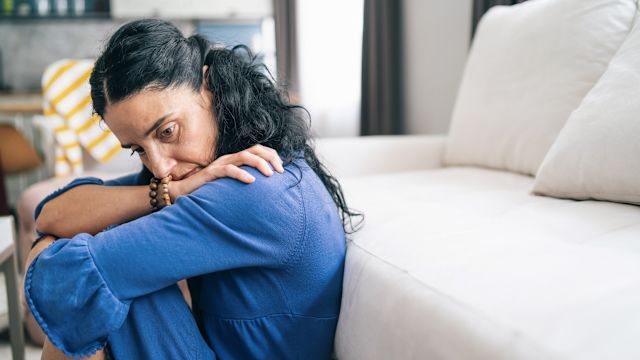Updated on May 24, 2024.
Depression affects more than 19 million people in the United States, but what exactly is it? Depression isn’t just a sad feeling—it’s an illness that interferes with a person’s daily life and their ability to function.
Symptoms of depression
Depression isn’t just feeling sad sometimes. It’s a real illness that can affect your daily life and make it hard to function.
There are many symptoms of depression. You might have some of them every now and then, but that it doesn’t mean you have depression.
If you have these symptoms most of the time for more than two weeks, you may have depression:
- Feeling sad or empty
- Feeling hopeless or helpless
- Feeling anxious, frustrated, or restless
- Feeling guilty or worthless
- Losing interest in things you like
- Feeling very tired much of the time
- Lacking energy
- Having trouble thinking, remembering, or making decisions
- Sleeping poorly
- Waking up too early in the morning or sleeping too late
- Being more hungry or less hungry than usual
- Gaining or losing weight without trying to
- Having aches or pains that don’t go away
- Thinking about death or suicide
Who depression affects—and how
Generally, signs of depression include feelings of sadness, hopelessness, fatigue, sleeplessness (or sleeping too much), inability to concentrate, thoughts of suicide and loss of interest in favorite activities or hobbies. But depression doesn’t affect everyone in the same ways.
Women
More common among women than men, depression often burdens women with feelings of sadness, worthlessness, and guilt. Women are more likely to seek treatment for depression than men, which may contribute to the higher rate of depression in women. Hormonal factors can influence depression in women—particularly postpartum depression—but there are many other causes, including stress, the loss of a loved one, divorce or marital issues.
Men
Men who battle depression often experience a loss of interest in once pleasurable activities and feel tired and irritable. These signs are often exacerbated by financial or legal woes, drug abuse and work-related stress. Depression is underreported in men, possibly due to the stigma many feel surround mental illness. Men who experience depression are more likely than women to self-medicate with drugs and alcohol, and are three and a half times more likely than women to die by suicide.
Teens
Teenage years can be difficult ones. Teen depression isn’t just a mood. It can affect teenagers in severe ways. Anxiety, eating disorders and substance abuse are common in teens with depression. Teens with depression typically express negativity, feelings of being misunderstood and may act out at school.
Children
A child’s behavior may be attributed to a stage but if a child is faking illness, refusing to go to school, clinging to a parent or expressing an irrational fear of a parent dying, the child may be suffering from depression.
Causes of depression
There are many factors that may contribute to depression. It may be caused by a combination of these and other factors, such as medications, medical problems and chemicals in the brain.
- Genetics: A family history of depression may mean you’re at greater risk for the illness.
- Stress: Trauma and stress can trigger depression. Common stressors include loss of a loved one, difficult relationships, childhood abuse and diagnosis of illness.
- Substance abuse: Drugs and alcohol affect the chemistry of the brain, and can contribute to stress.
Types of depression
There are several types of depression, including postpartum depression, seasonal affective disorder, which affects people in the winter months when there’s less natural sunlight, and psychotic depression, which is depression compounded by some form of psychosis, like hallucinations. Three other forms of depression include:
- Major Depression: Major depressive episodes can occur once or many times throughout a person’s life. This form of depression is characterized by symptoms that make it hard to eat, sleep, work and enjoy day-to-day life.
- Minor Depression: Like major depression, minor depression includes symptoms that interfere with normal daily activity, but they may be less severe or last for shorter periods of time.
- Dysthymic Depression: This form of depression, also called chronic depression, is characterized by the same symptoms as major or minor depression, but they last for longer periods of time—two years or longer.
Treatments for depression
The first step to treating depression is speaking with a healthcare provider (HCP). A primary care physician (PCP) can help you find a mental health professional trained to help diagnosed and treat depression. This condition is often treated with medication and psychotherapy, and in very severe cases, electroconvulsive therapy, or the use of electric currents.
Antidepressants are a mainstay in treating depression, but individuals experiencing delusions or hallucinations may need additional medications. Psychotherapy, or talk therapy, can help individuals discover new ways of thinking and behaving, which may change habits that contribute to depression. Talk therapy has also been used to help people who have attempted suicide or have self-harmed in other ways.
Don't wait to seek help
If you have depression, don’t be afraid to tell your friends and loved ones. Talk to an HCP. If you have thoughts of suicide or self-harm, get help. Text, call, or chat 988 to the 988 Suicide & Crisis Lifeline to talk to someone fast.







